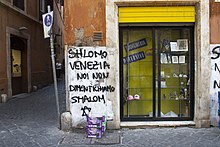Shlomo Venezia

Shlomo Venezia (
Biography
Venezia was born in Thessaloniki, where he was arrested with his family in March 1944; they were deported to the extermination camp at Auschwitz-Birkenau, one of the three main camps that made up the Auschwitz complex. During the selection made by Nazi doctors to separate deportees deemed fit to work from those "useless", who were immediately sent to the gas chambers, Venezia was saved along with his brother Maurice (Morris) and two cousins. During his imprisonment he was forced to work in the Sonderkommando ("special units"), teams of inmates that dealt with disposal and cremation of the prisoners killed in gas chambers. The members of these teams were killed to keep the secret about the conduct of the Final Solution (the systematic extermination of the Jewish people).
Venezia was one of the very few who survived the Sonderkommando corvées, and the only Italian among them; he published his recollections in a memoir published by Rizzoli in October 2007, Sonderkommando Auschwitz.[1][4] He died, aged 88, in Rome.
Experiences in Auschwitz
Venezia was subjected to the typical procedure of the deported to Auschwitz: shaving, showering, being tattooed with a number on the left forearm, and wearing the interned uniform. At the end of the procedure, Venezia was locked up in a separate and isolated section of the camp in quarantine, which—according to the German authorities in the camp—would have prevented the spread of epidemics inside the camp. After only 20 days of 'quarantine,' Venezia was assigned to the Sonderkommando of one of the large crematoria in Birkenau, made mainly of young and strong prisoners in good physical condition, because of the physical effort that the job required.[5]
Venezia was one of the few first-hand survivors of the 1944 revolt of the Sonderkommando. He describes the actual events and the days leading up to the revolt.[6]
Venezia was part of the Sonderkommando for six months. In Auschwitz-Birkenau, Venezia's mother and his two sisters were killed.
Shlomo features throughout Auschwitz - The Final Witness, a 2001 NY Festival winning film made by Sky for Channel 5, which reunited him with his Sonderkommando brother and cousin as they revisited the death camp together for the first time in over 50 years.
Bibliography
Shlomo Venezia. Sonderkommando Auschwitz. Penguin Books, 2007.
See also
References
- ^ a b "E' morto Shlomo Venezia sopravvisse alla Shoah". La Repubblica (in Italian). 1 October 2012. Retrieved 1 October 2012.
- ^ "Auschwitz survivor, author dies in Italy". Upi.com. 1 October 2012. Retrieved 1 October 2012.
- ^ Unesco. 1 October 2012. Retrieved 1 October 2012.
- ^ "maria_grasso1.pdf" (PDF). yadvashem.org. Retrieved 16 July 2012.
- ^ a b "Shlomo Venezia, ex-deportato di Auschwitz" (in Italian). Gli scritti. Retrieved 1 October 2012.
- ISBN 9780745643830.)
{{cite book}}: CS1 maint: date and year (link
External links
- Shlomo Venezia at IMDb
- Biography
